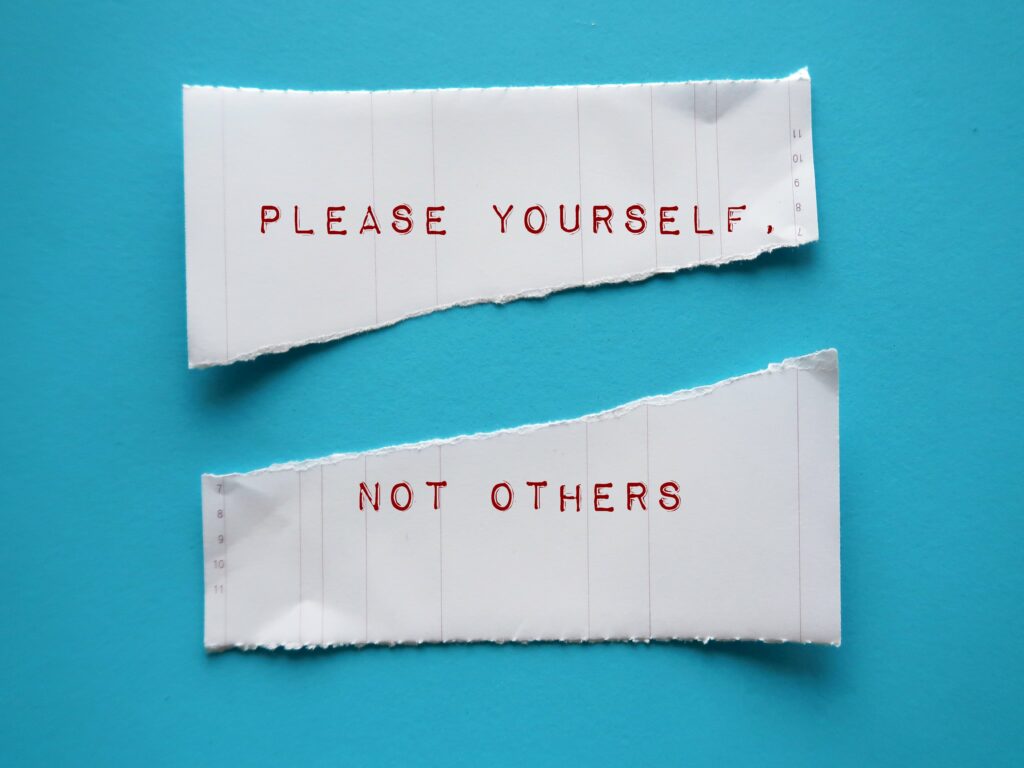1. What is People Pleasing?
Do you often find yourself saying yes to others, even if it means neglecting your needs and feelings of exhaustion? If this sounds like you, then you may be a people pleaser. Constantly attempting to make others happy, even at the price of our own needs and interests, is a common behaviour known as “people pleasing.”
It can be motivated by a desire to be liked and accepted by others, but it can also have a negative effect on our mental health by causing resentment and exhaustion.
In this post, we’ll delve into the causes of people-pleasing and provide practical tips on how to break the cycle and start prioritising your own needs and boundaries.
Whether you’re dealing with a toxic relationship or want to start taking better care of yourself, these strategies can help learn how to stop being a people pleaser and start living a more authentic and fulfilling life.
How To Stop Being A People Pleaser
2. How To Know If You’re a People Pleaser?
If you’re wondering whether or not you’re a people pleaser, here are some signs and traits to look out for:
- Struggling to Set Boundaries
- Seeking Approval and Validation
- Putting Others’ Needs Before Your Own
- Having Difficulty Saying No
- Feeling Guilty When Saying No
- Feeling Responsible for Others’ Feelings
- Feeling Drained After Social Interactions
- Struggling to Advocate for Yourself
- Saying Yes to Something You Don’t Want To Do
Struggling To Set Boundaries
People pleasers may struggle to set boundaries or assert their own needs and wants. As a result, you often say yes, even when you really want to say no. You may feel pressure always to be accommodating, even when it’s not what you truly want.
Seeking Approval and Validation
You always seek approval and validation from others. People pleasers often have a strong desire to be liked and accepted by others and may go out of their way to please others in order to receive praise and validation. If you find yourself constantly seeking approval from others and worrying about what they think of you, it may be a sign that you’re a people pleaser.
Putting Others’ Needs Before Your Own
You put others’ needs before your own. People pleasers may prioritise making others happy above their own happiness. They may feel guilty for saying no or for taking time for themselves.
Having Difficulty Saying No
You have trouble saying no. People pleasers may struggle to say no to requests or demands, even when they know it’s not something they can or want to do. They may fear rejection or conflict if they don’t comply.

Feeling Guilty When Saying No
You feel guilty when you say no. People pleasers may feel guilty or anxious after saying no to someone, even if it was a reasonable request. They may worry about disappointing others or being seen as selfish.
Feeling Responsible for Others’ Feelings
You feel responsible for others’ feelings. People pleasers may feel like it’s their responsibility to make others happy and to prevent others from feeling negative emotions. As a result, they may feel overwhelmed by the emotional needs of others.
Feeling Drained After Social Interactions
You feel drained after social interactions. People pleasers may feel drained or exhausted after constantly trying to make others happy or after regularly putting their own well-being aside. They may feel like they give more than they receive in relationships.
Struggling to Advocate for Yourself
You struggle to advocate for yourself. People pleasers may struggle to assert their own needs and wants, whether in personal relationships or professional settings. They may feel like their own needs aren’t as important as others.

How To Stop Being A People Pleaser
3. The Consequences of Being a People Pleaser
Being a people pleaser can negatively affect your mental health and well-being. These are some potentially negative impacts to be aware of:
Resentment
Resentment Constantly sacrificing your needs and wants to please others can lead to resentment. You may begin to feel taken advantage of or like you’re not being appreciated for all of the things you do for others. This resentment can lead to anger and frustration and can ultimately damage relationships.
Burnout
Burnout: People-pleasing can be exhausting, both emotionally and physically. Constantly putting others’ needs before your own can lead to feelings of burnout and exhaustion. As a result, you may find yourself feeling drained and overwhelmed and may struggle to take care of your own needs.
Lost Of Authenticity
People pleasing can cause you to lose touch with your wants, needs, and values. You may find yourself constantly trying to please others and may struggle to be true to yourself. This can lead to a sense of disconnection from your desires and can make it challenging to be authentic in your relationships.
Negative impact on relationships
People pleasing has the potential to harm your relationships. You may struggle to assert your own needs and boundaries, which can lead to conflicts and misunderstandings. As previously mentioned, constantly trying to please others can lead to feelings of resentment and can ultimately damage the relationship.
Decreased Self-esteem
People pleasing can also take a toll on your self-esteem. You may feel like you’re not good enough or that you constantly have to prove yourself to others. This can lead to feelings of inadequacy and low self-worth.
Decline Mental Health
People pleasing can also negatively impact your mental health. It can lead to feelings of anxiety and stress as you constantly worry about what others think of you and whether or not you’re pleasing them. It can also lead to feelings of depression, as you may struggle to take care of your own needs and may feel disconnected from your own wants and desires.

How To Stop Being A People Pleaser
4. Root Causes of People Pleasing
The root causes of people pleasing can vary from person to person, but some common factors may contribute to this behaviour. One potential cause is a desire to be liked and accepted by others. People pleasers may go out of their way to please others to be liked and to fit in. This desire for acceptance and belonging can be powerful in situations where the person feels like an outsider or is seeking validation.
Another potential cause of people pleasing is a lack of self-confidence or self-worth. People pleasers may feel like they are not good enough as they are and may believe that they have to constantly prove themselves to others in order to be accepted. This lack of self-worth can lead to a constant need for validation and can make it difficult for the person to set boundaries and assert their own needs.
People pleasing can also be a coping mechanism for dealing with difficult emotions or past traumas. For example, someone who was neglected or emotionally abused as a child may develop people-pleasing behaviour to avoid conflict or seek approval and validation. In this case, people pleasing can be a way to avoid facing difficult emotions and to feel more in control of their environment.
In addition to these individual factors, societal and cultural influences can also contribute to people-pleasing behaviour. For example, in some cultures, there is a strong emphasis on maintaining harmony and avoiding conflict, which can lead to people-pleasing behaviour to keep the peace.
Overall, the root causes of people pleasing are complex and may be influenced by a combination of individual, societal, and cultural factors. Therefore, it is essential to identify the specific causes of your own people-pleasing habits to address them effectively and prioritise your needs and boundaries. In the next section, we’ll explore some practical strategies for breaking the cycle of people-pleasing.
How To Stop Being A People Pleaser
5. How to Break the Cycle of People Pleasing
If you’re ready to break the cycle of people-pleasing, here are some strategies that can help:
- Identify The Root Causes of Your People Pleasing
- Practice Mindfulness and Self-awareness
- Set Boundaries and Communicate your Needs Clearly
- Assert Yourself and Learn to Say No
- Learn To Ask for Time When Making Decisions
- Repeat Helpful Affirmations
- Reflect On Your Values and Goals
- Surround Yourself with Supportive Relationships
Identify The Root Causes Of Your People Pleasing
Understanding the underlying reasons for your people-pleasing behaviour can help you to address it more effectively. This may involve exploring your own feelings of self-worth, past experiences, and cultural or societal influences. If you are struggling to determine or understand why you are a people pleaser, it is worthwhile seeking advice from a health care professional such as a phycologist or counsellor.
Practice Mindfulness and Self-awareness
Paying attention to your thoughts, feelings, and behaviours can help you become more aware of your limits. This can involve journaling, meditation, or simply taking time to reflect on your thoughts and feelings.
Set Boundaries and Communicate Your Needs Clearly
Setting clear boundaries and clearly communicating your needs can be essential in breaking the cycle of pleasing people. This may involve learning to say no or setting limits on the amount of time and energy you’re willing to invest in others.
Assert Yourself and learn to Say No
Asserting yourself and learning to say no can be difficult, but it’s an essential skill to develop in order to break the cycle of people pleasing. Practice saying no in small ways first, and remember that it’s okay to prioritise your own needs and desires.
Learn to Ask For a Time When Making Decisions
Instead of making decisions on the spot, try asking for time to consider your options. This can help you to make decisions that are more aligned with your own needs and wants.
Repeat Helpful Affirmations
Repeating positive affirmations or mantras can help you build self-confidence and assert your own needs and boundaries. Examples might include “I am worthy and deserving of respect” or “I have the right to set boundaries and prioritise my own needs.”
Reflect on Your Values and Goals
Taking time to reflect on your own values and goals can help you better understand what’s important to you and set boundaries that align with these values.
Surround Yourself with Supportive Relationships
Surrounding yourself with supportive and understanding relationships can help you to feel more confident in setting boundaries and asserting your own needs. Seek relationships with people who accept and understand your boundaries and needs.

How To Stop Being A People Pleaser
6. Tips on Overcoming the Fear of Disapproval
The fear of disapproval is often the root cause of people-pleasing behaviour, which is why it is critical to address this fear and learn strategies to overcome it to break the cycle of people-pleasing and focus on your own needs and boundaries. Some tips for overcoming the fear of disapproval include:
– Practice self-compassion
– Learn from criticism
– Seek out positive role models
Practice Self-compassion
One key to overcoming the fear of disapproval is to practice self-compassion. This involves being kind and understanding to yourself when you make mistakes or face criticism. Instead of beating yourself up, try to speak to yourself the way you would to a good friend. Remember that everyone makes mistakes and that being gentle with yourself is important.

Learn From Criticism
Instead of seeing criticism as a personal attack, try to view it as an opportunity to learn and grow. Take the time to listen to what others have to say and try to understand their perspective. While it’s important to set boundaries and not let others control you, it can be helpful to consider their feedback and see if there are any valid points that you can learn from.
Seek Out Positive Role Models
Surrounding yourself with positive role models who are confident and self-assured can be a helpful way to overcome the fear of disapproval. Look for people who can assert their own needs and boundaries without fear of judgment or rejection—seeing others who are able to be themselves and speak their truth can be a powerful example to follow.
Remember, overcoming the fear of disapproval is a process that may take time and practice. Be patient with yourself, and remember to focus on your own well-being and self-improvement rather than seeking approval from others.

How To Stop Being A People Pleaser
7. Conclusion
Ultimately, being a people pleaser can negatively affect your mental health and well-being, as well as your relationships. If you recognise any of these signs in yourself, it is possible that you are a people pleaser. Remember that it is not selfish to prioritise your own needs and to set boundaries with others, whether that is a friend, co-worker, or family member.
By learning how to identify when you are engaging in people-pleasing behaviour, you can take the necessary steps to break the cycle of people-pleasing and maintain a healthy and balanced life. Remember, if people pleasing is controlling your life, and you need further guidance on overcoming it, reach out to a counsellor or psychologist because you deserve to feel peace in your day-to-day life.
You Might Also like:
If you enjoyed reading How To Stop Being A People Pleaser, you might also be interested in:
- How Positive Intentions Can Change Your Life (16 Examples and Tips)
- 12 Morning Routine Ideas To Boost Mood And Productivity
- How To Plan Your Day For Maximum Productivity – 8 Strategies You Can Implement Today
- What is NSDR | 1# Ultimate Guide
- Goal-Setting Theory | How To Successfully Achieve Your Goals
- 51 Best Affirmations For Anxiety

